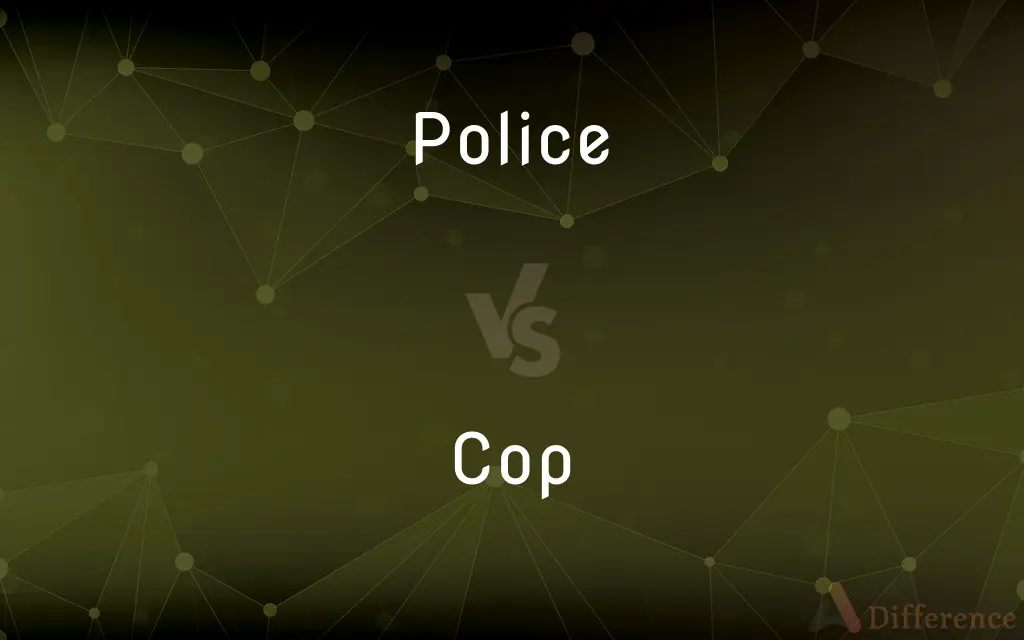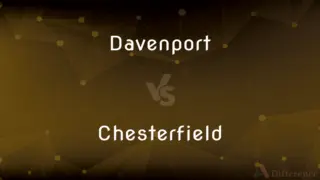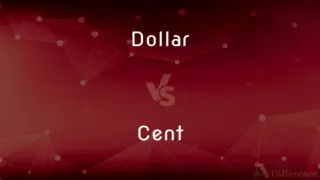Police vs. Cop — What's the Difference?
By Tayyaba Rehman — Updated on September 21, 2023
"Police" refers to the official law enforcement agency or its members. A "Cop" is an informal term for an individual police officer.

Difference Between Police and Cop
Table of Contents
ADVERTISEMENT
Key Differences
Police" is a term that encompasses the entire system of law enforcement in a community or country. It signifies the organized body responsible for maintaining public order and safety. On the other hand, "Cop" is a colloquial term that singles out an individual officer within that system.
The word "Police" can be used both as a noun to denote the collective group of law enforcement officers or as a verb, indicating the act of enforcing laws and maintaining order. In contrast, "Cop" is predominantly used as a noun, referring to a single member of the police force.
While "Police" carries a formal tone and is the term used in official contexts, "Cop" has a casual tone. The latter might be used more in daily conversation, popular culture, or media, whereas the former is preferred in formal reports, legal documents, and official communication.
Organizations and departments use the term "Police" to describe their collective presence and function. For instance, "Los Angeles Police Department." "Cop," however, personalizes this institution, giving a face to the individual officers who walk the beat, handle cases, or patrol the streets.
Both "Police" and "Cop" play pivotal roles in language, allowing speakers to distinguish between the broader system and the individual officers. While "Police" highlights the structure and formality, "Cop" brings forth the human element.
ADVERTISEMENT
Comparison Chart
Definition
An organized body of law enforcement officers.
An individual police officer.
Tone
Formal.
Informal.
Usage
Noun (collective) and verb.
Primarily noun (individual).
Context
Official documents, formal reports, news.
Daily conversation, popular culture, media.
Scope
Refers to the entire system or department of law enforcement.
Refers to an individual within that system.
Compare with Definitions
Police
An organized civil force responsible for maintaining law and order.
The police are investigating the incident.
Cop
A person responsible for enforcing the law.
That cop has been on the force for a decade.
Police
The regulation and control of a community.
It's the duty of the police to keep the streets safe.
Cop
A member of the police department.
The cop received an award for bravery.
Police
A body of officers representing the civil authority.
The police were called to manage the crowd.
Cop
A representative of law enforcement.
The cop took the statement from the witness.
Police
The act of maintaining law and order in an area.
The mayor promised to police the city more effectively.
Cop
A police officer
A cop in a patrol car gave chase
Police
The police are a constituted body of persons empowered by a state, with the aim to enforce the law, to ensure the safety, health and possessions of citizens, and to prevent crime and civil disorder. Their lawful powers include arrest and the use of force legitimized by the state via the monopoly on violence.
Cop
Shrewdness; practical intelligence
He had the cop-on to stay clear of Hugh Thornley
Police
A body of government employees trained in methods of law enforcement and crime prevention and detection and authorized to maintain the peace, safety, and order of the community.
Cop
A conical mass of thread wound on to a spindle.
Police
A body of persons with a similar organization and function
Campus police. Also called police force.
Cop
Catch or arrest (an offender)
He was copped for speeding
Police
(Archaic) Regulation and control of the affairs of a community, especially with respect to maintenance of order, law, health, morals, safety, and other matters affecting the public welfare.
Cop
Receive or attain (something welcome)
She copped an award for her role in the film
Police
(Informal) A group that admonishes, cautions, or reminds
Grammar police.
Fashion police.
Cop
Strike (an attitude or pose)
I copped an attitude—I acted real tough
Police
The cleaning of a military base or other military area
Police of the barracks must be completed before inspection.
Cop
A police officer.
Police
The soldiers assigned to a specified maintenance duty.
Cop
One that regulates certain behaviors or actions
"Faced with the world recession of the early 1980s, ... the World Bank ... became a stern economic taskmaster and cop" (Richard J. Barnet).
Police
To regulate, control, or keep in order with a law enforcement agency or other official group.
Cop
A cone-shaped or cylindrical roll of yarn or thread wound on a spindle.
Police
To impose one's viewpoint or beliefs regarding, especially in an authoritarian way
Policing others' comments by implementing speech codes.
Cop
Chiefly British A summit or crest, as of a hill.
Police
To critique in a presumptuous or arrogant manner
Policed the grammar of everyone who commented on the blog post.
Cop
To get hold of; gain or win
A show that copped four awards.
Copped a ticket to the game.
Police
To make (a military area, for example) neat in appearance
Policed the barracks.
Cop
To perceive by one of the senses
"copped a quick look at the gentleman ... on the right" (Gail Sheehy).
Police
A public agency charged with enforcing laws and maintaining public order, usually being granted special privileges to do so, particularly
Call the police!
Cop
To take unlawfully or without permission; steal.
Police
A department of local (usually municipal) government responsible for general law enforcement.
The Sheriff's Department has jurisdiction across most of Chicago but focuses on the unincorporated area and tasks like prisoner transport, leaving the rest to the Chicago Police Department.
Cop
To obtain, to purchase (as in drugs), to get hold of, to take.
Police
(UK) A branch of the Home Office responsible for general law enforcement within a specific territory.
Cop
(transitive) To (be forced to) take; to receive; to shoulder; to bear, especially blame or punishment for a particular instance of wrongdoing.
When caught, he would often cop a vicious blow from his father.
Police
Any of the formally enacted law enforcement agencies at various levels of government.
Cop
To see and record a railway locomotive for the first time.
Police
The staff of such a department or agency, particularly its officers; an individual police officer.
Cop
(transitive) To steal.
Police
People who try to enforce norms or standards as if granted authority similar to the police.
Who called the fashion police?
Cop
(transitive) To adopt.
No need to cop a 'tude with me, junior.
Police
Cleanup of a military facility, as a formal duty.
Cop
(transitive) To earn by bad behavior.
Police
Synonym of administration, the regulation of a community or society.
Cop
To admit, especially to a crime or wrongdoing.
I already copped to the murder. What else do you want from me?
Harold copped to being known as "Dirty Harry".
Police
(obsolete) policy.
Cop
Of a pimp: to recruit a prostitute into the stable.
Police
(obsolete) polity, civilization, a regulated community.
Cop
(informal) A police officer or prison guard.
Police
(transitive) To enforce the law and keep order among (a group).
Extra security was hired to police the crowd at the big game.
Cop
(obsolete) A spider.
Police
To clean up an area.
Cop
(crafts) The ball of thread wound on to the spindle in a spinning machine.
Police
To enforce norms or standards upon.
To police a person's identity
Cop
(obsolete) The top, summit, especially of a hill.
Police
A judicial and executive system, for the government of a city, town, or district, for the preservation of rights, order, cleanliness, health, etc., and for the enforcement of the laws and prevention of crime; the administration of the laws and regulations of a city, incorporated town, or borough.
Cop
(obsolete) The crown (of the head); also the head itself.
The stature is bowed down in age, the cop is depressed.
Police
That which concerns the order of the community; the internal regulation of a state.
Cop
A roughly dome-shaped piece of armor, especially one covering the shoulder, the elbow, or the knee.
Police
The organized body of civil officers in a city, town, or district, whose particular duties are the preservation of good order, the prevention and detection of crime, and the enforcement of the laws.
Cop
A tube or quill upon which silk is wound.
Police
Military police, the body of soldiers detailed to preserve civil order and attend to sanitary arrangements in a camp or garrison.
Cop
A merlon.
Police
The cleaning of a camp or garrison, or the state a camp as to cleanliness.
Cop
The top of a thing; the head; a crest.
Cop they used to callThe tops of many hills.
Police
To keep in order by police.
Cop
A conical or conical-ended mass of coiled thread, yarn, or roving, wound upon a spindle, etc.
Police
To make clean; as, to police a camp.
Cop
A tube or quill upon which silk is wound.
Police
The force of policemen and officers;
The law came looking for him
Cop
Same as Merlon.
Police
Maintain the security of by carrying out a control
Cop
A policeman.
Police
The members of such a force collectively.
Several police were stationed outside the building.
Cop
Uncomplimentary terms for a policeman
Cop
Take by theft;
Someone snitched my wallet!
Cop
Take into custody;
The police nabbed the suspected criminals
Cop
An informal term for a police officer.
The cop stopped him for speeding.
Cop
A slang term for a policeman or policewoman.
The cop gave a warning for the minor offense.
Common Curiosities
Is "Cop" a formal term?
No, "Cop" is an informal term for a police officer.
Can "Police" be used as a verb?
Yes, "Police" can be a verb meaning to regulate or enforce order.
Can "Police" refer to multiple officers?
Yes, "Police" can refer to the collective group of law enforcement officers.
Are all cops police?
Yes, all "cops" are members of the "police," but not all members of the police might identify with the term "cop."
Does "Cop" always refer to an individual?
Predominantly, "Cop" refers to an individual police officer.
Which term is used in official contexts?
"Police" is the term typically used in official contexts.
Is "Cop" derogatory?
While "Cop" is informal, it's not inherently derogatory, though context matters.
Is it correct to say "a police" when referring to an individual?
It's more common to say "a police officer" for an individual. "A police" is not standard.
Are there other slang terms related to "cop"?
Yes, terms like "fuzz" or "pig" are slang for police officers, but can be derogatory.
What's a common context for "Cop"?
"Cop" is often used in popular culture, like movies or songs, and in casual conversations.
Is "policeman" synonymous with "cop"?
"Policeman" is a more formal term than "cop," but both refer to male police officers.
Which term would be used in a news report?
News reports typically use the term "police."
Which term is more common in daily conversation?
"Cop" is more commonly used in informal daily conversation.
Can "Police" refer to a department or organization?
Yes, "Police" can refer to an entire department or organization, e.g., "New York City Police."
Is "Cop" an abbreviation?
"Cop" is believed to derive from "copper" or "constable on patrol," but it's not a direct abbreviation.
Share Your Discovery

Previous Comparison
Davenport vs. Chesterfield
Next Comparison
Dollar vs. CentAuthor Spotlight
Written by
Tayyaba RehmanTayyaba Rehman is a distinguished writer, currently serving as a primary contributor to askdifference.com. As a researcher in semantics and etymology, Tayyaba's passion for the complexity of languages and their distinctions has found a perfect home on the platform. Tayyaba delves into the intricacies of language, distinguishing between commonly confused words and phrases, thereby providing clarity for readers worldwide.














































